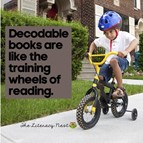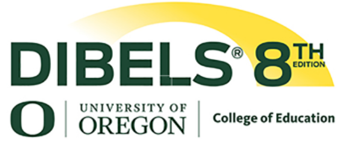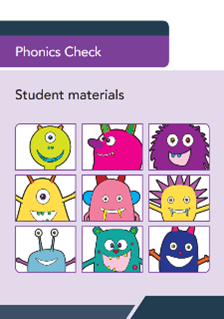If your family has been a part of DPSS for some time, you will have noticed some changes in how we teach reading and its inverse process, spelling. If you're new to DPSS, welcome! We'd love to share with you how we use evidence-based literacy practices to ensure that every child learns to read.
 Explicit and systematic synthetic phonics instruction. In 2021, with parent support and P&C funding, we began implementation of the Sounds-Write program at DPSS (https://www.sounds-write.co.uk). We use Sounds-Write's cumulative scope and sequence of sounds, progressing from simple to complex. We teach these sounds whilst also developing the skills of blending, segmenting and manipulating sounds to read and spell words. Students progress through the sequence as they master skills and knowledge, from the Initial Code through the Extended Code. In the upper school (Years 4-6), Sounds-Write lessons are coupled with word study emphasising morphology (learning about the meaning parts of words such as Greek and Latin roots) and etymology (the history and origin of words).
Explicit and systematic synthetic phonics instruction. In 2021, with parent support and P&C funding, we began implementation of the Sounds-Write program at DPSS (https://www.sounds-write.co.uk). We use Sounds-Write's cumulative scope and sequence of sounds, progressing from simple to complex. We teach these sounds whilst also developing the skills of blending, segmenting and manipulating sounds to read and spell words. Students progress through the sequence as they master skills and knowledge, from the Initial Code through the Extended Code. In the upper school (Years 4-6), Sounds-Write lessons are coupled with word study emphasising morphology (learning about the meaning parts of words such as Greek and Latin roots) and etymology (the history and origin of words).
Early intervention. If we see any signs that your child may be struggling with the foundational skills of reading, we do not take a 'wait and see' approach; we undertake diagnostic testing in reading sub-skills, implement interventions and monitor their progress. The most effective solution to the problem of reading failure is early identification and intervention.
 Phonemic awareness. This is the ability
to hear the individual sounds in words by
carefully listening, and to identify and manipulate those
sounds orally. While this skill is developed in Years Prep-2 through our use of
the Heggerty’s Phonemic Awareness program (https://heggerty.org/),
we ensure all students at DPSS continue to revise and maintain these
skills as their reading develops. Some students in the upper year
levels may need to practice these skills until they have firmed up this foundation of reading. Don’t be surprised if you have a 3rd-6th grader
who will be working on phonemic awareness! This is an area that the research
has indicated is hugely important.
Phonemic awareness. This is the ability
to hear the individual sounds in words by
carefully listening, and to identify and manipulate those
sounds orally. While this skill is developed in Years Prep-2 through our use of
the Heggerty’s Phonemic Awareness program (https://heggerty.org/),
we ensure all students at DPSS continue to revise and maintain these
skills as their reading develops. Some students in the upper year
levels may need to practice these skills until they have firmed up this foundation of reading. Don’t be surprised if you have a 3rd-6th grader
who will be working on phonemic awareness! This is an area that the research
has indicated is hugely important.
 Decodable readers. Students in the early years (and any student
still developing their decoding skills) will be working with decodable readers. These are books or passages that only
include words that the students can decode (sound out) according to the skills and
content they have been taught thus far in their Sounds-Write lessons. Children need practice with the phonics
skills they are learning, and these books and passages provide that practice. So be aware that at times, your children
may be bringing home a sheet of paper with a decodable passage for practice
rather than a book.
Decodable readers. Students in the early years (and any student
still developing their decoding skills) will be working with decodable readers. These are books or passages that only
include words that the students can decode (sound out) according to the skills and
content they have been taught thus far in their Sounds-Write lessons. Children need practice with the phonics
skills they are learning, and these books and passages provide that practice. So be aware that at times, your children
may be bringing home a sheet of paper with a decodable passage for practice
rather than a book.
 Assessments. In 2021 we commenced using DIBELS (Dynamic Indicators of Basic Early Literacy Skills, https://dibels.uoregon.edu/about-dibels),
a suite of research-validated assessment and progress monitoring tools that
track the five key areas of reading that we are teaching your child: phonemic
awareness, alphabetic principle, fluency with text, vocabulary and
comprehension.
Assessments. In 2021 we commenced using DIBELS (Dynamic Indicators of Basic Early Literacy Skills, https://dibels.uoregon.edu/about-dibels),
a suite of research-validated assessment and progress monitoring tools that
track the five key areas of reading that we are teaching your child: phonemic
awareness, alphabetic principle, fluency with text, vocabulary and
comprehension.  These nationally normed one-minute assessments give us a clear
indication of how easy or difficult reading is for your child. If a student is
identified with an area of reading difficulty, we will follow up with further diagnostic
assessments to determine the specific skill area/s where your child requires support. Strategies and monitoring will be put in place
to track their progress. As students become proficient and fluent word readers,
comprehension is a natural outcome. Comprehension
will also be monitored three times a year with three-minute assessments. If your child shows a weakness in any
area, they will be progress monitored and given interventions to help them
become stronger in their area of need. In addition to DIBELS, we continue to monitor
all students annually using the ACER PAT Reading and Spelling tests (https://www.acer.org/au/pat). In 2023, we began using the Year 1 Phonics Check to monitor the
progress of phonics acquisition in Year 1; yet another measure to ensure all
students receive the targeted intervention they require at their time of need (https://www.literacyhub.edu.au/for-families/what-is-the-year-1-phonics-check/).
These nationally normed one-minute assessments give us a clear
indication of how easy or difficult reading is for your child. If a student is
identified with an area of reading difficulty, we will follow up with further diagnostic
assessments to determine the specific skill area/s where your child requires support. Strategies and monitoring will be put in place
to track their progress. As students become proficient and fluent word readers,
comprehension is a natural outcome. Comprehension
will also be monitored three times a year with three-minute assessments. If your child shows a weakness in any
area, they will be progress monitored and given interventions to help them
become stronger in their area of need. In addition to DIBELS, we continue to monitor
all students annually using the ACER PAT Reading and Spelling tests (https://www.acer.org/au/pat). In 2023, we began using the Year 1 Phonics Check to monitor the
progress of phonics acquisition in Year 1; yet another measure to ensure all
students receive the targeted intervention they require at their time of need (https://www.literacyhub.edu.au/for-families/what-is-the-year-1-phonics-check/).
Home readers. Your child will work with a variety of books and
text types at school and at home. Some text may develop specific phonics and
decoding skills, some may be grade-level text to build background knowledge
that is pertinent to the curriculum they are learning, some texts may be
interest-based and selected by your child, and some will be at a determined
level for fluency practice. Prep and Year 1 students will bring home two books
each week for home reading practice - one decodable text (the "I read to
you" text) and another book of their choosing (the "You read to
me" text).
Knowledge building and vocabulary. Research has indicated that reading
comprehension is closely connected to the background knowledge we have on a topic and our understanding of the vocabulary contained in the text.
At DPSS, our students will have the opportunity to build a broad knowledge base of literature, HASS, Science, Health, and the Arts through close reading and explicit teacher-led
instruction. Children will have access
to complex texts,
often read aloud by their teacher, and develop
more complex vocabulary through direct
instruction and practice. Building
background knowledge and vocabulary occurs
from the earliest grades.